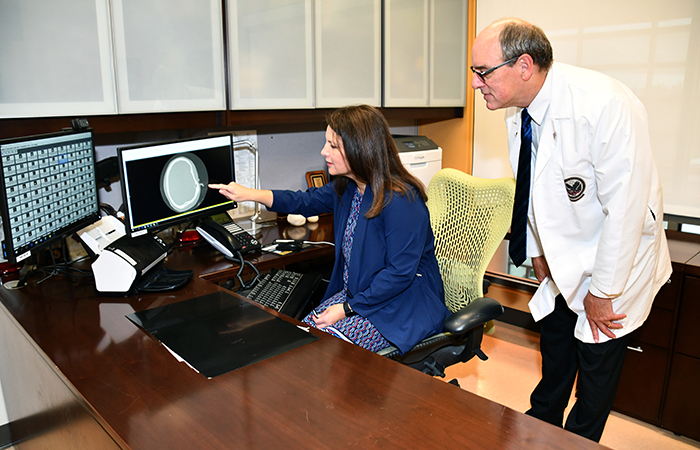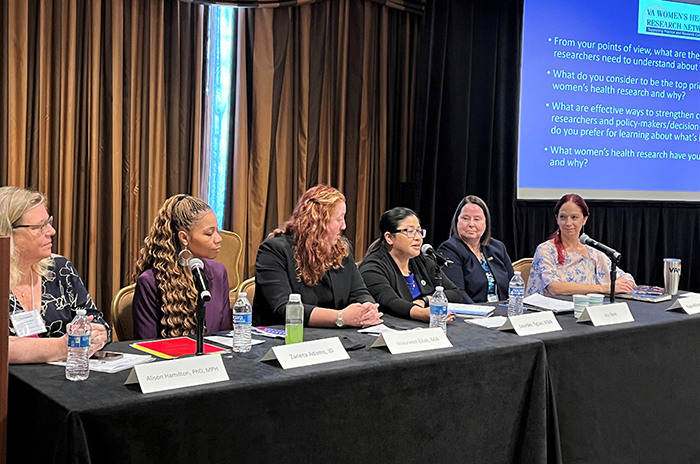Office of Research & Development |
 |


Drs. Steven Scott (standing) and Risa Nakase-Richardson are among a team of researchers studying brain injury at the Tampa VA. (Photo by Ed Drohan)
November 13, 2019
By Mike Richman
VA Research Communications
"People with TBI experience a dynamic process even at chronic stages, when active rehabilitation is uncommon."
A new study supports the need for specific rehabilitation services for Veterans who are in the chronic stage following a brain injury.
“It’s new information that ongoing rehabilitation needs exist in these chronic stages of TBI,” says Dr. Risa Nakase-Richardson, a clinical research neuropsychologist at the James A. Haley Veterans’ Hospital in Tampa, Florida.
She says the misconception that rehab services are relevant only in the short term after the injury is common among patients, caregivers, and providers.
“One of the reasons this study was funded was to explore these needs and help generate ideas on how to best address them. This paper does not address the barriers to getting those needs met. The reasons for those barriers may include a lack of awareness that rehabilitation can be re-engaged in chronic stages of TBI.”
The study finds that Veterans with a moderate-to-severe traumatic brain injury (TBI) have more unmet needs five years following trauma, mainly in community reintegration and accessing psychological services, than Vets who incurred mild brain injuries.

VA Researcher Named One of U.S.’ Top Female Scientists

2023 VA Women's Health Research Conference

Self-harm is underrecognized in Gulf War Veterans

Blood pressure drug could prevent posttraumatic headaches
The findings appeared in the journal Archives of Physical Medicine and Rehabilitation in October 2019 and were presented at a meeting of the American Congress of Rehabilitation Medicine this month.
The researchers determined that Veterans with moderate-to-severe TBI were more likely to report unmet needs in the areas of engaging in recreation, solving problems, getting around the community, improving job skills, and accessing psychological support. The two most frequently reported unmet needs five years after trauma were the same for Veterans with mild and moderate-to-severe TBI: improving memory and controlling physical symptoms.
The nearly 400 Veterans who took part in the study completed a survey that assessed cognitive, emotional, social, and functional needs. The Vets were part of the VA-TBI Model System, which produces data to assist VA in planning for the care and support of the many Veterans and families affected by brain injuries.
Nakase-Richardson is the key scientific investigator for the VA TBI Model System. The fact that the two TBI groups didn’t differ on some of the needs—improving memory and controlling physical symptoms—was surprising, she says.
“However, I think what’s driving those unmet needs is likely different across the two severity groups,” says Richardson, who is also a professor at the University of South Florida. “For example, the presence of health conditions [besides TBI] in a patient can impact functioning in such areas as clear thinking, memory, and being in good physical health. We know from other work that the types of co-occurring health conditions differ between the two groups.
“It may be that the mild TBI group is reporting cognitive problems due to co-occurring conditions, such as a sleep disorder, that may be treatable, and the moderate-to-severe group is left with cognitive problems due to significant brain injury,” she adds. “Though it should be noted that those with moderate-to-severe brain injury are also vulnerable to the negative effects of having co-occurring health conditions. Increasingly, there’s emphasis on managing co-occurring health conditions in TBI patients to improve outcomes, whether it’s mild or moderate-to-severe TBI.”
The reporting of unmet needs by Veterans with traumatic brain injuries is consistent with recent studies highlighting an evolution in patient recovery following a TBI, according to Richardson.
“For some, there continues to be improvement even after five years following a TBI,” she says. “For others, there’s a dip or the start of a decline. It’s unclear what’s driving those things. However, both trends highlight the fact that people with TBI experience a dynamic process even at chronic stages, when active rehabilitation is uncommon. Findings indicate that new needs may emerge and require re-examination to see if active rehabilitation or access to rehabilitation personnel, such as a rehab doctor, a medical specialist, a neuropsychologist, a vocational counselor, or a physical therapist, is needed.”
The VA TBI Model System was launched in response to a 2008 Congressional mandate that called for the creation of a database that would include information about Iraq and Afghanistan Veterans who showed TBI symptoms. The mandate also called for a 15-year study to understand the long-term needs of Veterans and service members after TBI. Richardson’s study is one of three rehabilitation studies being prepared for a report to Congress.
Traumatic brain injury is the signature injury from the post-9-11 conflicts. The Department of Defense and the Defense and Veterans Brain Injury Center estimate that 22 percent of combat casualties from Iraq and Afghanistan involve TBIs, most of which are mild in severity. Mild TBIs are also called concussions. TBI symptoms can include headaches, irritability, sleep disorders, memory lapses, slower thinking, and depression.
All of the nearly 400 Veterans in Richardson’s study were evaluated for rehabilitation needs in the chronic phase of TBI, which in this case would be five years following their injury. There has been a “paucity” of research, the investigators note, on chronic rehabilitation needs. Only one other study has analyzed the needs of patients with TBI at the five-year mark, Richardson says.
Nearly all of the participants in her study were men and most were white. Three-quarters of the Veterans had incurred moderate-to-severe injuries, with a five-year post-TBI follow-up. The Vets were from the five VA hospitals in the VA TBI Model System that specialize in rehabilitating people with traumatic injuries: Minneapolis; Tampa, Florida; Richmond, Virginia; Palo Alto, California; and San Antonio, Texas. Known as polytrauma rehabilitation centers, these facilities provide valuable information on TBI recovery trends.
Among the participants, 28% reported between one and five unmet needs, 15% said between 6 and 10, and 10% indicated more than 10. The most commonly cited unmet needs included improving memory, controlling physical symptoms, and managing emotions.
Richardson has a few theories on why the Veterans with moderate-to-severe TBI were more likely to report unmet needs in the areas of engaging in recreation, solving problems, getting around the community, improving job skills, and accessing psychological support.
“Some of these needs, such as driving and participating in recreational events, are not addressed by traditional medical professionals in chronic stages of TBI,” she says. “People evolve in later stages of TBI and can have new goals that didn’t exist earlier in active rehabilitation, when these needs would traditionally be addressed.
“For example, at one or two years post-TBI, people may not have had return to work as a realistic goal. However, at five years post-TBI, they may have improved further, and returning to work in some capacity and needing help with job skills to seek employment are now needed. In terms of accessing psychological support, evolution in the aftermath of TBI may lead to new stresses that create the need for access to mental health personnel, whether psychological or neuropsychological.”
The findings in her study, Richardson notes, lay the foundation for further research on predicting TBI outcomes in the Veteran community. She says additional research will help clinicians better understand, for example, how long it will take Veterans to recover from a TBI, their likelihood of returning to work, and their chances of living independently.
Dr. Steven Scott is the chief of physical medicine and rehabilitation at the Tampa VA. Richardson’s study, he says, emphasizes the importance of providing long-term rehabilitation to service members with moderate-to-severe brain injuries when they return home. Telerehabilitation programs would be an effective way of meeting their needs, he notes.
“Many specialty rehabilitation services do not exist in the community,” he says. “The future should call for establishing a virtual telerehabilitation program from specialty TBI centers to the homes and to the communities. The Tampa VA is establishing a virtual TBI team to provide specialty rehabilitation services anywhere in the country where Veterans reside. This gives us the opportunity to give freedom back—to think, talk, and walk—to those who fought for our freedom.”
VA Research Currents archives || Sign up for VA Research updates